Working in Schools: Who Receives Speech-Language Services and Why?

One of your responsibilities as a school-based SLP is to decide which children are eligible to receive speech-language services provided by the school and what those services include. When facing that decision, you may find yourself influenced by the profiles of students already on your caseload, the practice typically followed in your district or even your prior experience in other settings. However, you’ll often need clearer guidance than that to ensure that you’re making the best ethical, professional and legal decisions.
One of the best sources of guidance for you is the Individuals with Disabilities Education Improvement Act of 2004, or IDEA. Aligning with these federal mandates will help you move beyond traditional clinical models in order to meet each student’s individual needs as guaranteed under federal law.
IDEA offers you guidance for your decisions by providing specific information in three areas:
- Guiding Statements
- Student Performance to be Considered
- Full Range of Settings
Guiding Statements
IDEA makes a clear statement about our national policy for individuals with disabilities, including our obligation to ensure “full participation” (IDEA Part A(c)(1)). For students with disabilities, it’s important to make a distinction between “access to” various school activities and “full participation” in those activities. You need to determine if a student’s disability blocks their opportunity to participate fully in many aspects of their school experience and, if so, how you can help them gain full participation.
IDEA also states that we need to prepare students with disabilities for “further education, employment and/or independent living” (IDEA Sec. 300.1(a)). If you keep this long-range goal in mind, it can be a tremendous help in shaping goals and objectives for your services and in focusing on priorities for your students.
Student Performance to Be Considered
Too often, we base decisions about eligibility and goals on a student’s academic achievement, specifically grades. A student with passing grades, even if they’re low, will often be denied services. This interpretation of the law is too narrow. IDEA states that you must consider a student’s “academic achievement” AND “functional performance” (IDEA Sec. 300.320(a)(1)). This includes communication skills in many settings and interactions, from classroom discussions to extracurricular activities.
Full Range of Settings
IDEA specifies the school settings we need to consider. When determining eligibility and designing services, you must consider ways to help students with disabilities participate in “academic, nonacademic and extracurricular settings.” Full participation in school life includes more than just homework assignments and tests.
Beyond Traditional Models
Considering both academic achievement and functional performance in academic, nonacademic and extracurricular settings, you move closer to fulfilling our responsibility to ensure “full participation” as well as preparation for “further education, employment and/or independent living.” As stated earlier, this requires moving beyond traditional clinical models. My course on Educationally Relevant Speech-Language Services in Schools, as well as its companion courses of Effective Collaboration for School-Based SLPs, and Balancing and Scheduling Speech-Language Workloads in Schools, will provide you with specifics on how to achieve that.









